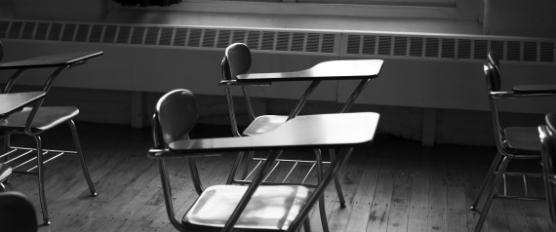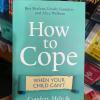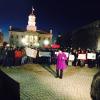Dear Public School Teachers,
We are sorry. On behalf of graduates of public schools, parents of children in public schools, those who value public education and teachers unions, we apologize. Your profession has been vilified, scapegoated, mined for profit, and deprofessionalized.
Earlier this year, a kindergarten teacher named Suzi Sluyter resigned after more than 25 years as an educator. She wrote: "I have watched as my job requirements swung away from a focus on the children, their individual learning styles, emotional needs, and their individual families, interests and strengths to a focus on testing, assessing, and scoring young children, thereby ramping up the academic demands and pressures on them... I did not feel I was leaving my job. I felt then and feel now that my job left me."
Ms. Sluyter taught in Cambridge, MA, but her letter articulated the concerns of teachers from across the country – from small towns to cities. Tenure protections have been gutted and public schools starved while standardized tests, lay-offs and charters proliferate.
Here in New Jersey, in the city of Newark, under the state appointed superintendent's One Newark plan, several schools will be closed, turned over to charters, or "renewed." A "renewed" school means that all the teachers have to reapply for their jobs. (It's quite the euphemism.) Black teachers would be disproportionately affected by the plan as they are more likely to teach at schools targeted by One Newark. Black and/or low-income students are also more likely to attend these schools.
From students to PTO presidents, Newark residents are fighting the plans to privatize, close or "renew" their schools. This month, hundreds of students walked out to protest One Newark and the underfunding of their public schools. "I'm sick and afraid about what's going to happen to our school," said Nydiqua Johnson, 16, a junior at West Side High School in Newark. "They're closing my school, and I really don't appreciate it. And most of our teachers are getting fired."
Down the turnpike, off Exit 9, the small town of Highland Park has not been immune to the school reform agenda. Last fall, the district eliminated nearly a dozen essential positions, including literacy coaches and a counselor who helped students with substance abuse issues; two of the eliminated positions were held by the local union President and Vice President. At the same time, a data analyst (a new position to the district) and two administrators were hired, each commanding a six-figure salary. In response, the teachers and staff union endorsed a letter stating, in part: "We are currently working in a climate of fear and uncertainty due to the lack of good judgment, foresight, communication, and absence of humanity shown by our Board of Education as well as the sweeping changes that are being implemented by our administrative leadership."
As teacher autonomy and creativity is replaced with uniformity and data-driven instruction, no detail is too small to be managed, scripted and judged. Earlier this year, administrators in Highland Park told teachers at the primary school, which houses pre-Kindergarten through first grade, how to craft their bulletin boards. The bulletin boards were to follow specific guidelines on how and what was displayed. The teachers' evaluations were to be based, in part, on their bulletin boards. In New Jersey, poor evaluations in two successive years jeopardize a teacher's tenure. More than 200 parents, residents and alumni signed a letter (including this author) addressed to the Board of Education, stating their opposition to using bulletin boards to assess teachers.
And, so, to the educators in Highland Park, to those in Newark, to those in Cambridge, to those across the nation, we apologize. To those educators who value play, critical thinking and creativity, we apologize. To those educators who are driven from the profession, we apologize. To those educators who believe that not all children learn at the same speed or in the same way, we apologize. To those educators who have seen public education turned into a business to make the rich even richer, we apologize.
But we know words are not enough. We all learned the importance of "show, don't tell" in the public schools that educated us.
We refuse to allow public education to be privatized, perverted by profits, and reduced to endless hours of test preparation. We refuse to allow our schools to be judged, opened, closed, and funded on the basis of test scores. We refuse to allow the teaching profession to be scripted and threatened.
We write this letter to apologize, yes. But also to say we are angry, fed up, and inspired to opt-out, speak out and stand with you.
In solidarity,
Those who care about and value public education
















